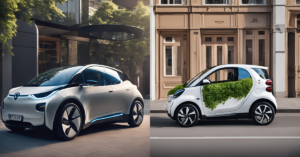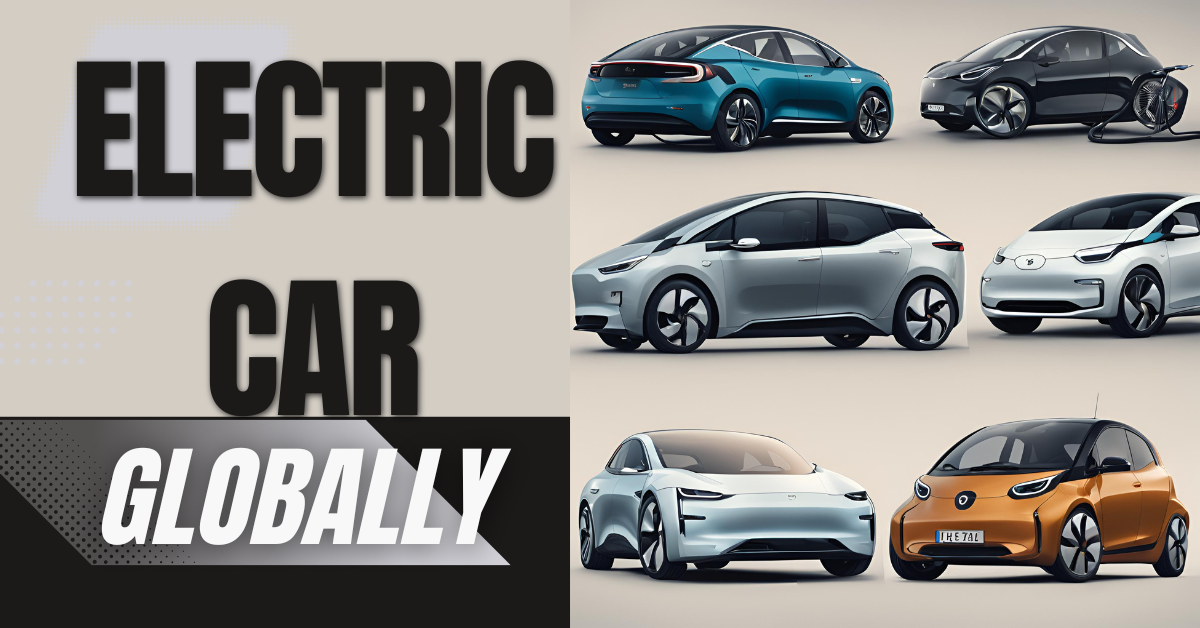Electric Cars Globally gaining popularity worldwide due to their environmental benefits and advancements in technology. They offer a sustainable alternative to traditional gasoline vehicles.
Electric cars represent a significant shift in the automotive industry. With zero emissions, they help reduce pollution and combat climate change. Technological advancements have improved their range and efficiency, making them more practical for everyday use. Many countries are investing in charging infrastructure, further supporting the growth of electric vehicles (EVs).
Government incentives and decreasing costs are also encouraging consumers to make the switch. As awareness of environmental issues grows, the demand for electric cars continues to rise. This trend signals a transformative move towards greener transportation globally.
Rise Of Electric Cars

Electric cars are changing the way we think about transportation. They are clean, efficient, and fun to drive. The technology behind them is fascinating. Let’s get into the key areas making electric vehicles better.
Battery Innovations
The heart of an electric vehicle is its battery. Batteries are getting better every year. They store more energy and last longer. This means electric cars can travel further on a single charge.
New materials like lithium-ion and solid-state are leading the way. These materials are lighter and more powerful. They also charge faster. This makes electric cars more convenient for daily use.
- Lithium-ion batteries: High energy density, long lifespan.
- Solid-state batteries: Safer, faster charging.
Charging Infrastructure
Charging stations are becoming more common. This makes owning an electric car easier. You can charge your car at home, work, or public places.
There are different types of chargers. Some are fast, while others are slower but cheaper. The most common types are:
- Level 1: Standard wall outlet, slow charging.
- Level 2: Requires special equipment, faster charging.
- DC Fast Charging: Very fast, mostly found at public stations.
Charging networks are growing. Companies are adding more stations. This helps reduce “range anxiety” for drivers. It means you can drive long distances without worrying about running out of power.
Here’s a quick look at the charging options:
| Charger Type | Charging Speed | Common Locations |
|---|---|---|
| Level 1 | Slow | Home |
| Level 2 | Medium | Home, Work, Public |
| DC Fast Charging | Fast | Public |
Electric vehicles are the future. Battery and charging technology will keep getting better. This makes them a smart choice for everyone.
Technology Behind Electric Vehicles
Electric cars are changing the way we think about transportation. They offer a cleaner, greener alternative to traditional vehicles. This change is significantly impacting the environment.
Reduction In Emissions
Electric cars produce zero tailpipe emissions. This means they don’t release harmful gases like carbon dioxide and nitrogen oxides. These gases contribute to air pollution and climate change.
By using electric cars, we can reduce air pollution in cities. Cleaner air means better health for everyone. Electric cars help fight against climate change by lowering greenhouse gas emissions.
| Type of Emission | Gasoline Cars | Electric Cars |
|---|---|---|
| Carbon Dioxide (CO2) | High | None |
| Nitrogen Oxides (NOx) | High | None |
| Particulate Matter | High | None |
Sustainable Materials
Electric cars often use sustainable materials in their construction. These materials are better for the environment.
Manufacturers use recycled plastics and metals. Some companies even use natural fibers. These choices reduce waste and pollution.
- Recycled plastics for car interiors
- Aluminum for lightweight frames
- Natural fibers like hemp for panels
Using sustainable materials also reduces the carbon footprint of car production. This means making electric cars is less harmful to our planet.
Environmental Impact
Electric cars are revolutionizing the automotive industry. They offer numerous economic benefits. This section explores the most significant advantages. From cost savings to job creation, electric cars are transforming economies worldwide.
Cost Savings
Electric cars save money on fuel. Electricity is cheaper than gasoline. Maintenance costs are also lower. Electric cars have fewer moving parts. This means fewer repairs and replacements.
Governments offer incentives for buying electric cars. These include tax credits and rebates. These incentives lower the initial cost. Over time, the savings add up. Here’s a simple comparison:
| Expense | Electric Car | Gasoline Car |
|---|---|---|
| Fuel/Year | $500 | $1,200 |
| Maintenance/Year | $300 | $800 |
| Government Incentives | $7,500 (one-time) | $0 |
Job Creation
Electric cars create new jobs. These jobs span across various sectors. Manufacturing electric vehicles requires skilled labor. This boosts employment in factories.
The demand for electric car charging stations is rising. This creates jobs in infrastructure development. Research and development in electric vehicles also generate jobs. These include engineers, scientists, and technicians.
Here is a list of job types created by the electric car industry:
- Manufacturing Workers
- Infrastructure Developers
- Engineers and Technicians
- Sales and Marketing Professionals
- Maintenance and Service Providers
Electric cars support local economies. They create jobs in various fields. This boosts economic growth worldwide.
Economic Benefits
Government policies play a crucial role in promoting the adoption of electric cars globally. These policies can make electric cars more affordable and appealing to consumers. They also ensure that electric vehicles meet safety and performance standards.
Incentives And Subsidies
Many governments offer incentives and subsidies to encourage people to buy electric cars. These financial benefits can significantly reduce the purchase cost. Below is a table showing some countries and their incentives:
| Country | Incentive |
|---|---|
| United States | Federal tax credit up to $7,500 |
| Germany | Up to €9,000 rebate |
| China | Subsidies up to ¥20,000 |
- Tax credits: Reduce the amount of tax you owe.
- Rebates: Get money back after purchasing an electric car.
- Grants: Funds provided to lower the cost of electric cars.
Regulations And Standards
Regulations and standards ensure electric cars are safe and efficient. These rules help build trust among consumers. Some key regulations include:
- Emission standards: Limits on harmful gases emitted by cars.
- Safety standards: Rules to protect passengers in case of accidents.
- Performance standards: Minimum requirements for car performance and battery life.
These regulations also push car manufacturers to innovate. They need to create better and safer electric vehicles. Compliance with standards ensures high-quality electric cars for everyone.
Government Policies
The world of electric cars is evolving rapidly. New trends are shaping the future of transportation. Innovations in technology and energy are leading the charge. Let’s explore some of these exciting future trends.
Autonomous Driving
Autonomous driving is a game-changer for electric cars. Self-driving technology promises safer and more efficient travel. Many companies are investing heavily in this area. Electric cars with autonomous capabilities will soon become mainstream.
- Safety: Autonomous cars reduce human error.
- Efficiency: Optimized routes save energy.
- Convenience: Hands-free driving offers more comfort.
These benefits make autonomous driving a key future trend. Electric cars will lead this revolution.
Integration With Renewable Energy
Electric cars and renewable energy are a perfect match. Charging electric cars with solar or wind energy is becoming common. This integration reduces carbon footprints significantly.
| Renewable Source | Benefits |
|---|---|
| Solar Energy | Abundant and free. |
| Wind Energy | Clean and sustainable. |
Using renewable energy for electric cars is a smart choice. It aligns with global sustainability goals.
These future trends will shape the electric car industry. Embracing them will lead to a cleaner, smarter world.
Challenges And Barriers
The global adoption of electric cars is rising fast. Nations worldwide embrace this green technology. Governments implement policies to support electric vehicles (EVs). The automotive industry responds with innovative models and improved technology.
Leading Countries
Several countries lead the charge in electric car adoption:
- Norway: Norway boasts the highest per capita EV ownership. Over 54% of new cars sold in 2020 were electric.
- China: China is the largest market for electric cars. It sold 1.3 million EVs in 2020.
- Germany: Germany is Europe’s top EV market. It saw 194% growth in electric car sales in 2020.
- United States: The US has significant EV adoption. California leads with over 700,000 EVs on its roads.
Emerging Markets
Emerging markets show great potential for EV adoption:
- India: India aims for 30% EV sales by 2030. The government offers incentives to boost EV manufacturing.
- Brazil: Brazil explores electric buses and trucks. This shift reduces pollution in urban areas.
- South Africa: South Africa promotes EVs to reduce reliance on fossil fuels. The country invests in charging infrastructure.
These emerging markets are crucial for global EV growth. They help reduce emissions and promote sustainable transportation.
Frequently Asked Questions
What Percentage Of Cars Worldwide Are Electric?
As of 2023, around 10% of cars worldwide are electric. This number continues to grow each year.
Which Country Has The Most Electric Cars?
China has the most electric cars. It leads the world with over 5 million electric vehicles on its roads. The country promotes electric mobility through incentives and investments.
What Country Has 100% Electric Cars?
No country currently has 100% electric cars. Norway leads with the highest percentage of electric vehicles.
Is The World Moving To Electric Cars?
Yes, the world is shifting to electric cars. Governments and automakers are investing heavily in electric vehicle technology.
Conclusion
Electric cars are transforming global transportation with eco-friendly benefits. Their rising popularity signifies a shift towards sustainable living. Governments and manufacturers are investing heavily in this green technology. Embracing electric vehicles can reduce our carbon footprint and pave the way for a cleaner future.
The journey towards global adoption of electric cars is just beginning.
